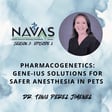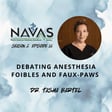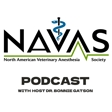
Journey to a VTS in Anesthesia and Analgesia with Vivienne Montony CVT and Melissa Vehouc-Clark CVT, VTS A&A - Ep. 8
If you’re a veterinary technician who loves practicing anesthesia as much as we love talking about it on this show, then maybe you have thought about becoming a veterinary technician specialist (VTS) in Anesthesia and Analgesia. If you haven’t heard that term before, an individual with a VTS in Anesthesia and Analgesia is a certified or licensed veterinary technician who has undergone a rigorous application and testing process that demonstrates their superior knowledge when it comes to the care and management of anesthetized patients. The organizational body that oversees this rigorous process is the Academy of Veterinary Technicians in Anesthesia and Analgesia (AVTAA). In this episode, host Dr. Bonnie Gatson dives deep into the application process in a round table discussion with a technician who is just beginning her VTS application journey and a technician who just recently obtained her VTS in Anesthesia. Together, the panel discusses the possible career benefits of obtaining a VTS in Anesthesia, what type of work environment will set you up for the best possible experience during the prequalification phase, and we will provide tips on how to maximize your efforts and avoid pitfalls during the later application and examination phases.
We would like to thank our guest panel: Vivienne Montony, CVT, veterinary anesthesia technician at the University of Wisconsin, and Melissa Vehouc-Clark, CVT, VTS (Anesthesia and Analgesia), lead veterinary anesthesia and surgery technician at Community Care Veterinary Specialists in Gainesville, FL.
If you would like to learn more about the application process, please visit the AVTAA website
If you like what you hear, we have a couple of favors to ask of you:
- Subscribe to the North American Veterinary Anesthesia Society (NAVAS) for access to more anesthesia and analgesia educational and RACE-approved CE content.
- Spread the word. Share our FB or IG post, re-tweet, post something on a network or a discussion forum, or tell a friend over lunch. That would really help us achieve our mission: Reduce mortality and morbidity in veterinary patients undergoing sedation, anesthesia, and analgesia through high quality and peer-reviewed education.
Thank you to our sponsor, Dechra - learn more about the pharmaceutical products Dechra has to offer veterinary professionals, such as Zenalpha.
If you have questions about this episode or if you want to suggest topics for future episodes, please reach out to the producers of this podcast at education@mynavas.org.
An AVTAA representative for NAVAS was consulted for this episode. However, all opinions and thoughts stated by the host and their guests are theirs alone and do not represent the thoughts or opinions of any corporation, non-profit, university, or other business or governmental entity.
Special thanks to Chris Webster, Saul Jimenez, and Maria Bridges for making this podcast a reality.







